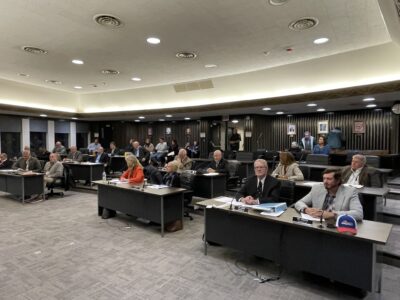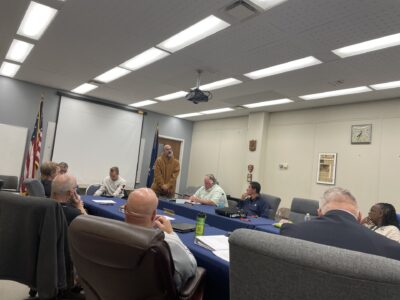City BPU Proposes Microgrid Project With Grant Funding

The Board of Public Utilities is proposing a microgrid through potential Grid Resilience and Innovation Partnerships grant funding under the Bipartisan Infrastructure Law. The grant request is for $12 million, with a $3 million local share. According to the BPU and city administration, the microgrid would increase the city’s resiliency and reliability in emergency situations. P-J photo by Timothy Frudd
To increase the reliability and resiliency of the city, the Jamestown Board of Public Utilities is considering a new microgrid system.
The BPU is applying for a Grid Resilience and Innovation Partnerships program grant for funding under the Bipartisan Infrastructure Law to create a microgrid system. According to the BPU, the proposed microgrid system would utilize “existing power generation equipment to energize a resilient network” through underground electrical “distribution circuitry.”
The goal of the microgrid would be to ensure a “high level” of utility resiliency and reliability in downtown Jamestown. The microgrid would be separate from the current regional 115 kV system and would provide electricity for public services, schools, shelters, the city’s hospital and local businesses during emergency situations. The microgrid would also be capable of charging electric vehicles in emergencies, such as power outages.
In addition to providing emergency access to essential services and local businesses in the community, the microgrid would provide regional resiliency, renewable generation and grid flexibility.
Currently, the BPU is proposing a federal grant request of $12 million, with a local share of $3 million.
Mayor Eddie Sundquist told The Post-Journal the microgrid is one of “several programs” the city and the BPU have applied for in coordination with the city’s investment of a grant writer.
“We’re really excited, honestly, to be able to, on behalf of the BPU, to just tap into some of the new federal resources that are coming under the Infrastructure Act,” Sundquist said. “This is obviously one of them; it’s been really great. We’re really starting to tap into some of these federal resources.”
Sundquist said the reason Jamestown is able to apply for certain grant programs such as the microgrid is because the city is considered a “Justice 40 community.” As a result of Jamestown’s label as a “Justice 40 community,” Sundquist said there is an executive order from the president that requires 40% of grant funding to go toward communities that have been impacted by manufacturing pollution or other contaminants.
“Jamestown is considered one of those disadvantaged communities, separate from New York’s disadvantaged community process,” he said. “Because of that, we are in line to receive various federal funds.”
Sundquist said the concept of a microgrid is something the BPU has been looking at in order to increase energy storage as the city beings to “electrify” its businesses and homes in the “not so distant future.” While Sundquist said the city is “probably not” looking at “full electrification” over the next decade, he stressed the importance of looking ahead and considering ways of moving toward more sustainable energy sources.
“We have always tried to be progressive in our interactions in terms of our utility and just the work that we do as a city,” he said. “We see this as the next logical step for how we look towards that future, and micro grids are one of those developments.”
Sundquist told The Post-Journal that there are multiple potential benefits of having a microgrid in the Jamestown region.
“I think number one is just ensuring diversity in our supply is really important,” he said. I think number two, you’re looking at being a bit more environmentally conscious as we go through this process, and I think number three, it’s really investing in new technology and investing in new opportunities for the city.
Asked if the BPU faces any challenges in securing the grant funding, Sundquist said that like any other grant process, the city cannot be sure whether or not it will be successful at obtaining the funding. Although BPU General Manager Dave Leathers highlighted the potential of the project to receive grant funding at the BPU’s recent board meeting, both Leathers and Sundquist acknowledged that there is no guarantee.
“Are we going to get it? I don’t know the answer for that,” Sundquist said. “But certainly, the city is in a great spot in order to apply and just to continue being on the cutting edge of the work we do as a utility.”






